Quitting
Choosing Who to Confide In at Work
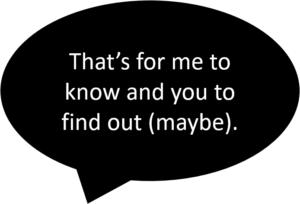 The people you work with are often either the best or the worst parts of your job. When those relationships are positive, it can make you more productive, successful, and happier.
The people you work with are often either the best or the worst parts of your job. When those relationships are positive, it can make you more productive, successful, and happier.
When the other parts of your job aren’t going well, having trusted colleagues to confide in can help you get through the day.
Whether they are work friends, your staff, your boss, your peers, people in organizations that work with your organizations, Human Resources – anyone involved with your work – think twice before sharing confidential information. Telling the right person your secrets can strengthen your bond and make the relationship more important to both of you. Telling the wrong person can damage your reputation and career.
Who to trust with specific information can depend more on the individual’s personality than their* position in the company, but there are some common factors to keep in mind.
When You’re Looking for a New Job but Haven’t Accepted an Offer Yet
Your boss: Almost always no.
If you have a positive relationship with them, you might think they would appreciate knowing that you intend to leave before you turn in your two weeks’ notice. However, generally level-headed people can still take it personally, as though you are leaving them not the job. They might also be resentful that they will have to deal with hiring and training a new person and managing your workload until the position is filled. If your news overlaps with performance review timing, you could be punished for disloyalty.
There are only two circumstances when telling your manager may be better than keeping it to yourself. The first is when your boss has explicitly encouraged you to grow your career by taking advantage of job opportunities. The second is when you’ve witnessed your manager supporting other team members who have left the team.
Your employees. No.
Telling your staff that you plan to leave will make them worry about their own jobs.
Your peers. Usually not.
Even your work friends may be jealous or not want you to change the dynamic in your organization. You might feel guilty withholding this information, as though you are being a bad friend. It is more useful to remember that a lot of things can go sideways until you have a signed offer in your hands. It’s much better to wait and share the good news once you’ve landed a position.
The exception is when you need a work reference and can count on a peer to help sell a recruiter on your capabilities.
Health Issues
Your boss, your employees, and your peers: It depends on their personality.
For every person I know who had workplace support through a significant illness, I know of another person who was made miserable during the experience, or even pushed out of the company.
If you’ve got doctor-ordered treatments that take you away from the office or cause obvious physical changes, you don’t have a choice about whether to keep it a secret or not. With other illnesses, it can be difficult to know if you will be supported or punished. The best you can do is evaluate the level of empathy your management has shown for you and others.
You may be able to confide in your manager but keep it a secret from your peers and staff.
Human Resources Issues
Your boss: If your workplace requires it and/or they will actually help you.
If there’s something going on that violates company policy, it’s not paranoid to consult the employee handbook to understand your obligations. If for example you witness employee theft, the policy likely requires you to step forward or else be punished if caught.
If you are thinking about going to your HR department about a workplace issue, remember that they are there to protect and support the organization first. Anything your report is likely to be shared with your manager.
It’s tough to be in a situation where reporting an issue may be the ethical thing to do but puts your job at risk. The media reports on big whistle-blower cases and employee lawsuits. We don’t hear about the other thousands of instances when an employee is forced out or fired for calling attention to a problem.
Your employees: Nope.
Your peers: Probably not.
Unless you and your peers are collectively talking about an issue, it is in everyone’s interest to keep it to yourself. You don’t want to drag other people into situations that could put them at risk or get you in trouble for revealing information that you’ve been asked not to talk about.
Other Personal Stuff
Your boss, your employees, your peers, and everyone else in this world: Share with caution.
When you have Other Personal Stuff impacting your life, of course you need to talk about it with others. Talking helps alleviate some of the burden, and unless you’re a robot, you need some support.
Just be careful who you confide in. People that are otherwise pleasant and even caring towards you might react in unhelpful ways.
Of course if you have any doubt that they might share your personal information with other people: avoid! It’s not worth it. People love to gossip. Don’t become their story of the week.
Many people do not deal with Other Personal Stuff very well. It might be too uncomfortable for them, or they don’t know how to respond. That sucks, but it is kind of understandable. Some people just don’t realize that when in doubt, any of these work: “I’m sorry to hear that. That sounds stressful. Are you ok?”
Worse than clueless but benign people, though, are people who respond so badly that they make your situation worse. Bad responses might be downplaying or denying your situation, victim-shaming, or telling you how you should be coping. On top of whatever issue you’re experiencing, then you have to deal with being blamed or shamed, feeling betrayed, or feeling alone in a situation where you need help from others.
Unfortunately, it can be hard to tell who is unsafe to confide in until it is too late. Friends and family members are just as likely to respond badly as your coworkers. So don’t spill your guts. If there’s someone you feel compelled to share your story with, get a feel for their reaction before you provide the details.
With all people and all topics
Remember that once you tell anyone personal information, you lose control of it and who else they might tell.
*I’m using the plural for he/she/his/her because using “he” alone is gender-unfriendly and writing “he or she” is annoying.
Dealing with career disappointment
It is disappointing when you are not where you want to be in your career.
Maybe you thought by the time you were this age that you would be managing a department or earning a milestone salary.
Maybe you hop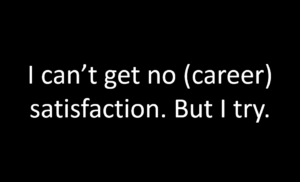 ed that after working this many years in your organization, that you would have been promoted by now.
ed that after working this many years in your organization, that you would have been promoted by now.
Maybe you expected that after the education and training you spent time and money on that you would enjoy your profession – but you don’t.
Or you’ve bounced from job to job and still don’t know what kind of job would make you happy.
I’ve met so many people that are frustrated with their careers for these reasons. The ones that are currently experiencing it often tell me that they feel defeated. They aren’t hopeful that they will ever find career satisfaction. It can be hard to believe it when you’re in the murky depths of a job disappointment, but I can tell you with certainty that is that there is still time for you.
You could still achieve the specific career goal that you have right now. There could be one small shift in your organization – a new manager or a new set of responsibilities that changes everything.
One man that I met about 10 years ago could not seem to get a break in his workplace. Let’s call him John. Year after year, John got not-so-great performance reviews and it seemed like he wasn’t going to move up the career ladder at his company – his career was stalled. Then out of the blue, John’s manager left the company and his new manager took an interest in him. He gave him recognition for his work that he hadn’t had before and praised him to other managers. That year, he finally got promoted and apparently continued to do well – very well: I ran into John last year and learned that he still works for the same company and is now an executive.
The small shift could come from something as simple as on-the-job training that you’re required to do.
A woman that I know, “Abby”, was content in her marketing job at a medium-sized company. Then her manager sent her to a training seminar to learn process improvement that would help the department run more effectively. Abby returned from the training lit up with passion for the techniques she learned.
I remember how excited she was when she talked about it. Her perspective of work went from “this job is ok” to “I know what I want to do with my life.” She kept finding ways to apply her new knowledge. At first, this was within the company she worked for. Then Abby sought out more training on her own, met people in the process improvement field, and through those connections got a full time job doing work that she loved.
If you haven’t found a meaningful job yet, you still can. In my research about people quitting jobs, I heard from dozens of people who were frustrated and exhausted with their work, yet found their way into career satisfaction. I spoke with people in their twenties and people in their late sixties – and all the decades in between. It’s not too late!
Many of the people I talked to could not have imagined their careers they have today back when they felt stuck and unhappy. There were no overnight changes. Instead, they followed their interests one step at a time and discovered opportunities along the way.
If you don’t know where to start, the most useful advice that I learned was to just learn more about whatever topic it is that you’re interested in and see where that leads. This might mean going to a seminar on whatever topic you are curious about. Or looking up information about it on the web or reading a book. Or volunteering for a cause that you care about. I’ve met full-time, paid care-givers at three different animal sanctuaries who started as casual volunteers. They are some of the happiest job-changers that I know.
Just take one step in the direction that interests you. It might lead you down the hallway of your current organization into a slightly different role, or into the dream job you never knew you wanted.
The Coffee Can Method of Getting a Dream Job
 Elizabeth Gilbert tells a story about a woman who dreamed of traveling the world, but was an impoverished single mother. The woman put a single dollar bill in a coffee can every day. As Gilbert tells it, the woman figured that they had so little money that one dollar didn’t make a difference. After many, many years, once the kids were grown, the woman finally had enough money saved to travel on a cargo ship that visited a number of different ports. She sustained her goal for two decades, and achieved it.
Elizabeth Gilbert tells a story about a woman who dreamed of traveling the world, but was an impoverished single mother. The woman put a single dollar bill in a coffee can every day. As Gilbert tells it, the woman figured that they had so little money that one dollar didn’t make a difference. After many, many years, once the kids were grown, the woman finally had enough money saved to travel on a cargo ship that visited a number of different ports. She sustained her goal for two decades, and achieved it.
I like this story. I especially like to remember it when it my goals seem distant and so difficult to achieve – specifically, publishing my self-help book for people that want to quit their jobs. It will happen, someday!
I also like to remember the coffee can story when I think about all of the people who are unhappy in their jobs, who feel stuck and have very real obstacles that make it difficult to quit. Their current jobs have health insurance for their families and the jobs they want do not. Their current jobs pay the rent and the daycare and the jobs they want would not cover those bills. Their current jobs are in the towns where they share custody of their children with their ex-spouses, and the jobs they want are in other parts of the country.
These are real blockers.
Still, getting unblocked is realistic. Saving money is fundamental in creating more choices for work. It can take a long time, and setbacks from unexpected expenses are frustrating. Yet it is possible.
There are other possibilities for getting unstuck, but they too can be long journeys. Doing a “side hustle” is the safest, most risk-adverse way that I know of to launch a new career. However it takes energy and motivation to spend time on a side business before going to a day job in the morning, and to work on it at night and on weekends. Sometimes it might seem worth it, and other times it might seem too exhausting.
I relate to this particular struggle. My drive to complete my book and shop it out to agents and publishers competes with my desire to have downtime and rest. In my case, choosing rest means that it will just take longer to complete my goal.
Hopefully not twenty years.
There are also ways to lessen the pain of the current job while working towards the dream career. Building confidence through honing skills and racking up “wins” by completing projects to the best of abilities helps. Fine-tuning resumes and LinkedIn profiles is a good idea for everyone. Expanding life outside of work to include hobbies, friends and fun is a great way to keep a miserable job from feeling like it is all-consuming.
We hear all the time that “life is short”. But time is relative, so life can also be long. It’s okay if you didn’t start putting money in the coffee can ten years ago. You can start now. You can start any time.
The job you want is there for you, even if it is far enough away that you can’t quite believe it yet.
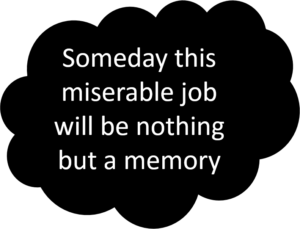
If you are struggling with your toxic work environment – good
If you are struggling with your toxic work environment – good. 
I’m sorry that you’re in a negative work situation, but the fact that you’re struggling with it is positive.
If you are resistant when your management instructs you to take actions that are bad for customers or waste shareholder money – good. You care about doing the right thing.
If you are caught between the need to speak up about workplace bullying and the need to keep your paycheck and healthcare benefits – good. Your ethics are showing.
If the subtle, persistent discrimination against certain employees leaves you feeling drained – good. Your body itself is signaling that you are in a dangerous environment.
I am sorry that you are in a job that harms your wellbeing. However, I am glad that you are reacting negatively to a noxious job situation. Your struggle reflects your morality and your desire for fairness. You have integrity. You are in touch with human decency.
I am not worried about your humanity.
I am worried about the other people, the ones who succeed in toxic work environments.
Employees who heartily laugh along with their manager’s discriminatory jokes and respond positively when others are harassed are encouraging this behavior to persist.
Employees that willingly support management decisions that waste time and money are also guilty of wasting time and money.
Employees that unscrupulous managers rely on to support their unethical tactics are also behaving unethically.
People that thrive in toxic work environments perpetuate them. They care more about advancing their careers than they care about integrity.
So, if you are struggling to survive in a toxic work environment – good.
I hope that you advocate for change that improves the situation for you and your coworkers. If that is not possible, save yourself and change jobs before you sink into a pit of stress, depression or low self-esteem.
Most importantly: I hope you keep your integrity.
Your Performance Review Isn’t Fair
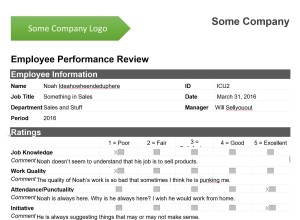 Your performance review is not about how well you served your customers, increased profits, reduced costs, expanded the business, or improved employee morale.
Your performance review is not about how well you served your customers, increased profits, reduced costs, expanded the business, or improved employee morale.
Your performance review is not fair whether it is positive or negative, whether you want to believe it is 100% true or 100% false, and whether you like or loathe your manager.
Your performance review reflects how well you served the department’s objectives.
Perhaps the objectives are clearly defined and understood. Book X amount of sales in new business; Y amount in renewals. Seems non-subjective. What’s the problem?
So many.
So many problems.
For example:
1) Employee A exceeds the sales goals. She should get an excellent review, no? But she doesn’t, because the review process allows for subjective feedback in addition to the objective numbers, and her manager writes in her review that she is not a team player, has low long-term prospects to grow in the company, and lacks initiative.
2) Employee B does not meet the sales goals. He should get a below average review, yes? No, he gets a glowing review. His manager notes in his review that there were unusual circumstances that prevented him from achieving the goals. The economy slowed sales. And, this employee is a positive contributor to the team and deserves an above average review.
3) Employee C does not meet the sales goals. He notes in his self-evaluation that his top customer was restructuring and unexpectedly froze large purchases for the current year. However, he proposed a set of products that would help the customer save significant costs through efficiency, and the customer committed to a purchase that would set a new record in next quota period, plus sustain sales for years to come. So this employee missed his current year goals in order to do the right thing for the customer and for his employer in future years. He should get a great review for doing the right thing for the business, right? No. His manager gave him a poor performance review for not meeting current goals.
These employees are just as likely to report to the same manager as they are to three different managers in the same department, or different managers in different parts of the company.
Disconnect your self-image and self-worth from what your manager writes on your performance review. That document might matter in terms of the bonus or raise you get, or whether you get promoted or are being pushed to leave the organization. However, it isn’t fair, so don’t let it mean more to you than what it is: a tool in the game you signed up for when you accepted this job.
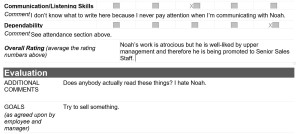
Remembering What Was Good About A Bad Job
 Last weekend I spent time with a friend that I met when I was at a not-so-favorite job. Let’s just say that particular job had many challenges. And not the exhilarating kind that lead to career success and personal fulfillment.
Last weekend I spent time with a friend that I met when I was at a not-so-favorite job. Let’s just say that particular job had many challenges. And not the exhilarating kind that lead to career success and personal fulfillment.
I hadn’t seen this friend in a long time and it popped into my head that her friendship was one of the best things I got from that job. We had a lot of fun while we helped each other cope.
That made me want to remember the other positive outcomes that came from a difficult work experience. Here are a few:
- I am passionate about the projects I managed and am proud of what I accomplished.
- I got to explore two specific types of marketing that I was less familiar with. I built solid skills in those areas that gave me the necessary qualifications for future work.
- I formed friendships and trusted relationships with colleagues that are still important to me.
These benefits are obvious to me, and I acknowledge them when they impact me. When I thought about it more I realized there are less obvious and more personal benefits:
- I learned what my boundaries are and sharpened the line between what I am and am not willing to do to succeed in business.
- I finally accepted that business isn’t always fair. Accepting this killed some of my idealism. However, it affirmed the type of businessperson I am and made it easier to detach from the fairness of an outcome that is not in my control.
- I changed my definition of success. Climbing the corporate ladder is only one way of evaluating success. There are many different ways to be successful in business – not to mention in life.
It takes time to recover after leaving a negative job, just as it does when leaving any significant relationship that was painful. If you’re recently out of a tough work situation I hope that you allow yourself to be angry about what wasn’t right and grieve for the hopes you had for that role.
Eventually, I hope you will also remember what you gained.

How to Survive a Horrible Boss
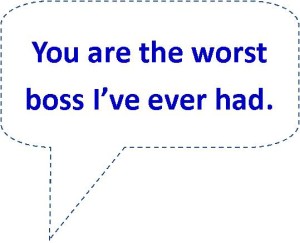 Unfortunately, most of us will report to a boss that we hate at least once in our working lives. If it is just once, consider yourself lucky. I have a friend who has reported to five complete jerks and only two normal people in 15 years. It has been so tough on her that whenever she leaves one jerk behind to take a new role, I’m scared that the new boss will turn out to be just as jerky as the last.
Unfortunately, most of us will report to a boss that we hate at least once in our working lives. If it is just once, consider yourself lucky. I have a friend who has reported to five complete jerks and only two normal people in 15 years. It has been so tough on her that whenever she leaves one jerk behind to take a new role, I’m scared that the new boss will turn out to be just as jerky as the last.
A horrible boss can take many forms. She might yell at you or humiliate you. He might take credit for your work and blame you for his mistakes. She could try to sabotage your career out of spite. He could constantly change the direction of your projects, favor your teammates while disparaging you to others, threaten to fire you, or otherwise bully or harass you. Do any of these characteristics remind you of someone you’ve reported to?
The good news is that if you are stuck with a lousy manager, there are coping mechanisms that you can use until you or the creep move on.
One: Make friends with your boss’s peers. This is a strategic maneuver. If your boss’s peer group respects and likes you, then your boss has more to lose by treating you poorly. For example, if you provide information, resources, or anything else of value to another team within your department and you do it well, that team will not want you to get fired or quit in frustration. Get to know the managers of these groups. Show interest in them. Ask how you can provide additional value.
If the people in these teams don’t provide positive feedback to your manager on their own and you have an ally you can trust, ask that person to send an email touting your contribution. If you are visible in the department as someone whom other teams respect and depend on, your manager may grudgingly treat you better.
Two: Make friends with your boss’s boss. As with your boss’s peer group, being visible to your boss’s boss is essential. This person must know your name and recognize you when he or she sees you. If your work culture supports “skip-level” meetings, take advantage of it. Find out what this person cares about, worries about and what the goals are for his or her area of responsibility. Then think of smart questions to ask that will be easy for that person to answer. Ask about factors that contributed to recent successes. Treat the person like a respected mentor – say that you want to excel in your role and ask how he or she achieved career growth.
When you pass your boss’s boss in the halls, say hello and add any personal comment that is appropriate. If he or she has only recently met you, start off with, “Hi Cheryl, it was great to meet you the other day. I’m Joe Smith on Roger’s team. Thanks for the advice on the XYZ.”
Be natural and genuine, not smarmy!
Then when it is time for your boss to get approval for who to gives promotions or bonuses to, or how individuals are rated in performance reviews, your odds of having a favorable outcome are significantly increased than if you are completely unknown.
Three: Document your work and email it to your boss. Figure out a schedule that is not obnoxiously often and not so far apart that it is forgettable. Maybe every Friday, or once every two weeks. Keep it short so you don’t waste time and so that it has a better chance of being read. Even if it isn’t read, it is a record of your performance that you can bring up in meetings with your manager. This exercise is to cover your ass, so make sure your boss can’t use the excuse that your emails got lost in her inbox.
A good format is to make the subject line “Joe Smith’s Project Update, October 2, 2015″, then make a bullet list of three to six in-progress or completed projects. Use as much hard data as you can to support results. Examples:
- Closed $128K in hardware sales last week, and am at 102% of my quarterly quota.
- Delivered the Safety Training to 56 client teams year-to-date. The pass-rate is 92% vs. the goal of 90%, and satisfaction survey results are 95% vs. the goal of 90%. Satisfaction is currently 10% higher than last year.
- Delivered the ABC parts to XYZ customer on October 1, 2015, four days ahead of the due date. Received a thank you email from XYZ’s purchasing manager, Jane Smith.
Four: Document your boss’s poor behavior towards you. In any crappy work situation, documentation is critical. Many public and private sector organizations require managers or the Human Resources department to create a paper trail of documentation before they fire an employee to cover their tracks in case of a complaint or lawsuit.
Turn the tables and create your own documentation about how your manager treats you. Think of it as insurance in case you need to use it to protect your reputation. Document dates, verbatim quotes, witnesses and how the action violated the employee handbook (if applicable).
Your record of events may protect you if the situation gets worse. If your boss violates company policy towards you, maybe she has done the same to other people. Someone may have raised complaints in the past. If you decide to speak up or find yourself defending your integrity, your notes are likely to impact the outcome.
If you are fired, you might be able to use the documentation to get unemployment benefits. I know people in multiple states who have done this!
Or, you might choose to never disclose your notes. If so, it wasn’t a wasted effort. The act of documenting your reality is cathartic and can prevent you from feeling like you are the crazy one. Bad managers often specialize in lowering employees’ self-esteem and making them feel like failures. Don’t let them have that power over you.
Five: Remember that your manager doesn’t own you. I deliberately avoided using the terminology for a manager as someone “you work for.” You actually work for the organization – your manager is just the person you report to. I don’t even like the word “boss”…because you are the boss of your life and that person is only charged with the responsibility to manage you as an employee.
Your work is one part of your life, not your whole life. Don’t let your manager “follow you home” and ruin your weekends. Make that person as insignificant in your life as possible by focusing on what you do have influence over (see numbers 1 – 4!).
If you are currently dealing with a horrible manager, I hope you will have a new manager soon! Refresh your resume and LinkedIn profile. Get testimonials about your performance if possible (see numbers 1 and 2!). Save copies of your achievements and kudo’s from coworkers or customers (see number 3!). Brush up on any important skills and stay on top of current trends and technologies in your field.
And until then, I hope these tactics help you survive.
Maybe your life sucks because your job sucks
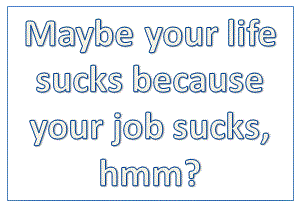 For the last two weeks I’ve been writing about how life can suck and then it gets better. Now I’m going to show you this really cool trick where you can take any topic that you’ve been writing about and connect it back to the main point of your blog, which in my case is about careers. Are you ready? Here goes:
For the last two weeks I’ve been writing about how life can suck and then it gets better. Now I’m going to show you this really cool trick where you can take any topic that you’ve been writing about and connect it back to the main point of your blog, which in my case is about careers. Are you ready? Here goes:
First of all, a lot of times our lives suck because our jobs suck, and those jobs almost never get better. When they improve, it is usually because your evil boss got fired, you moved to a new team or a new manager, or you got a big promotion that will make you happy for about two weeks. Usually it doesn’t get better, and that’s why I’m writing a book about quitting jobs, so you can go do something else that doesn’t suck.
This is true.
But there is an even deeper connection to how and why our lives suck when we’re in the wrong jobs. The reason is that when you are working in an environment that doesn’t support your authentic self and is not in alignment with your values, it is not the right job for you. No matter how much it pays, how important your title sounds, or how fancy your office is, if your job isn’t a part of living your “right life”, then it is not going to be pleasant.
You might love some parts of your job, and that can make it confusing. I sure adored the team of people I used to work with and was incredibly passionate about the program I was responsible for.
Our relationship to work is similar to any relationship, and there’s ups and downs, good and bad, and changes. It took me a long time to let go of my last full-time employee position because of the positive things about it. But once I realized that it wasn’t the right environment for me to be my truest self, I started planning my exit.
When I finally quit and began aligning my choices with my values, my life became magical. Really. I’ve written about it before, but it still amazes me how much easier and fun life was. Quitting my job had the biggest impact on my life, but along with that I made other changes to be truer to myself. I let go of some people that made me feel dragged down instead of uplifted. Instead of spending all my time working or sleeping, I pursued my interests in animal sanctuaries, started writing again, and looked for ways to tap into my creativity.
After quitting, there was a period of uncertainty and I wasn’t sure exactly what to do, so I just kept living day by day and sometimes hour by hour, making choices that felt like I was staying on track with my values. When things would start to go sideways, I would course-correct immediately. It wasn’t long before I found my way into my consulting business that I love, made deep and lasting friendships and was happier than I had ever been before.
Then, of course, there came the tough times and challenges. Living my “right life” didn’t prevent my beloved cat from getting sick and dying, it didn’t stop my family from having difficulties, and it sure didn’t block out the personal issues I’m facing now. Those things are still hard and hurt…you know, the life sucks part.
Yet I am coping with tough times so much better than I would have when I wasn’t living as close to my ideals. I have a better support system to help me now. I have many things to be grateful for, including my amazing work-life, many people I care about, and appreciation for living in such a beautiful part of the world. The magic is still there. It is just working in subtler, persistent ways.
I’m choosing to believe that part of the reason for my struggles is that there is an area of my life that needs to change. I don’t know exactly what steps I need to take, or what the outcome will be. I’m not even sure if it is an external life change or internal self-development. But I know, because I have experienced this before, that as long as I stay true to myself I’ll make the right decisions at the right time.
This faith gets me through the toughest moments.
Faith, gratitude, and my sense of humor. When times are really good or really rough, I like to name my moods and my outfits, act a little reckless while remaining completely safe, and make playlists. Stay tuned for the “when life sucks but actually everything is going to be ok” playlist, coming soon.
I want to quit my job…two years from now
 I’ve had a lot of conversations with people who tell me they want to quit their jobs, but not right now. They want to quit in two years. The most common reason is that people want to stop doing their current work and do something else…but they don’t know what that is. For some reason they think that in two years they will have figured that out.
I’ve had a lot of conversations with people who tell me they want to quit their jobs, but not right now. They want to quit in two years. The most common reason is that people want to stop doing their current work and do something else…but they don’t know what that is. For some reason they think that in two years they will have figured that out.
However, when you’re working a ton of hours in a stressful position, you don’t have much mental space or energy to determine what your next best job is. Plus, your free time is spent recovering or distracting yourself from your unhappy situation.
I feel your pain.
It wasn’t until I made up my mind that I was going to quit my job that I began to have ideas about what my future might look like. There was a definitive moment, a changing of my mindset, when I set my intention to quit. I turned my focus away from trying to make my current job situation better and focused on creating a better life. Like magic, I started getting inspired and followed my interests as far as they would go.
Here are a few examples of the actions I took and what they led to:
- After eight years without any creative writing, I started filling notebooks again. The ideas for stories, poems and lyrics popped into my head without even trying. I decided that after I quit my job I would spend a month at Naropa University’s Summer Writing Program. Once there, I wrote the outline for my self-help book for people who want to quit their jobs. I started this blog. I also kept writing creatively, joined writing groups, and volunteered with a literary magazine.
- I began researching and visiting animal sanctuaries. I documented their best practices and what they needed to improve. I have no idea if this will lead to any paid work in my future, but it was meaningful to me. The current outcome is that I have three favorite animal non-profits: Best Friends Animal Society, Chimpanzee Sanctuary Northwest and The Wild Animal Sanctuary.
- I realized that my love of research, analysis, report-writing and justice could lead to a career in private investigation. I got certified, built a marketing plan and decided this would be my next job. In case you haven’t been following my blog – I did not become a P.I. But planning to be a P.I. gave me the courage to quit my job and continue pursuing my interests until I ultimately began my consulting business.
Which leads me to this point: you don’t have to figure out your next job right now. All you have to do is follow your interests. Two years from now, your ideal job may be completely different – and better – than anything you can dream of now.
Happily, I’m not a data point of one. Many people who I spoke with followed a winding path to a satisfying career. If you need more convincing, read Martha Beck’s Finding Your Way in a Wild New World.
If you’re convinced but are thinking “what do I do now, I don’t even know what I’m interested in”, just experiment with one small, easy thing that you will enjoy doing. Make something with your hands. Revisit an old hobby. Do something you liked doing as a kid. Talk to a friend in a career that you may be interested in. Take a class or an evening workshop in a subject you are curious about. Read.
If you’re on the right track, more and more opportunities will open up to you, just as starting to write poetry again led to a month of writing classes and my book-in-progress.
When you’re not on the right track, you’ll lose interest or life will throw signs at you that it is time to change direction. For example, as I neared the date when I planned to quit my job, I began to doubt that a formal career in investigation was the right choice even though I enjoyed the process leading up to it. At the same time, a former coworker and I came up with a business idea and created an LLC in a blink. Several months later I realized our company wasn’t going to generate a salary and I moved onto my backup plan of consulting, which turned out to be a perfect career for me.
I didn’t cling to my initial idea out of stubbornness or misplaced determination. I was open to each new opportunity and was willing to move forward or change my plans as I went along. I like the metaphor of walking on a path with a lantern that only illuminates the step you’re at and where to place your feet next.
For example, if you are interested in making elaborate, one-of-a kind cakes, you don’t have to buy a bakery or launch a catering business. Have a friend or two commission desserts from you and if you enjoy it, do more. You might find that you only want to bake cakes for your loved one’s birthdays because it is a creative outlet and you feed off of their gratitude. Maybe you’ll realize you don’t want to make cakes for strangers, you don’t want to bake at all in the summer, and you really don’t want to produce a customer’s requested design if it isn’t a style you’re interested in.
When you pay attention, the universe will give you nudges in the right direction. What matters is that you are taking action. You are signaling that you are open to discovering a new path, one step at a time. If it leads you to another step forward– great! If you dislike it, or the choice generates negative results, then pursue your other interests.
If you’re one of those people who want to quit their jobs in two years, be clear about your intention. Then take one small action and you’re on your way.



Recent Comments